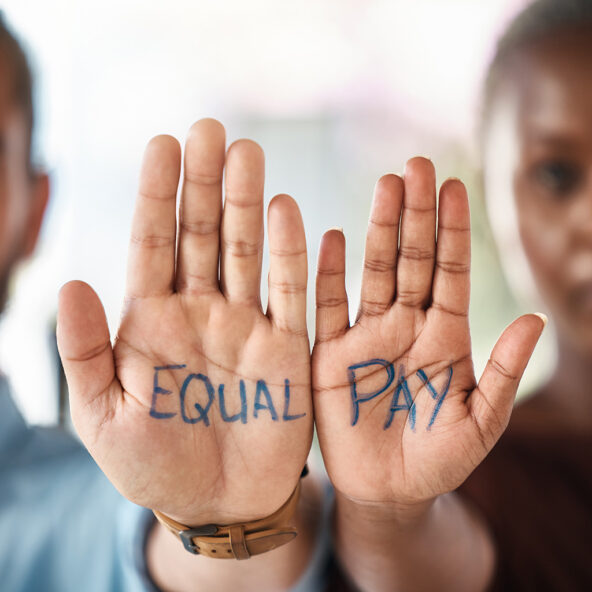What is Religious discrimination?
Religious Belief Ground
Religious belief includes religious background and those who have no belief.
If someone treats you less favourably because you have a different religion to someone else, or, for example, because you do not have a religion and someone else does.
What is Religious Discrimination in Work?
Discrimination on the ‘religion ground’ happens where there is less favourable treatment of one person compared to another person because one has a different religious belief, background or outlook from the other, or that one has a religious belief, background or outlook and the other has not.
The areas of work covered include advertising, pay, access to employment, vocational training, work experience, terms and conditions, promotions, pensions, dismissal, and collective agreements.
Example An employer asks a candidate their religion, or if they believe in God.
What law protects you against discrimination in work?
The Employment Equality Acts (EEA) protect you from discrimination at work.

What is covered by the law?
The EEA applies to many aspects of work, including:
- Job advertising and access to employment (including interviews)
- Terms and conditions of employment, such as equal pay
- Promotion and dismissal
- Classification and re-grading of posts
- Retirement
- Collective agreements (for example, those made through a union)

Who is covered by the law?
You are protected by the EEA if you are:
- A full-time, part-time or temporary employee
- A public or private sector employee
- A self-employed contractor or partner in a partnership
- An officeholder in state or local authorities
- Seeking work through employment agencies
- A trainee doing vocational training
- A member of a trade organisation, trade union or professional body
- Doing paid work experience
Note: The Employment Equality Acts do not cover volunteers.
Meaning of terms
An employee – works or has worked under a contract of employment. Employment means performing a service under the direction of another person in return for pay. Contracts include contracts of apprenticeship and any other written or verbal agreements where you agree to provide work or service to another person.
An agency worker – provides an employment agency with work or service for another company or employer, whether or not the other company or employer signs the contract.
Vocational training – is instruction in the skills or knowledge you need to do a particular job.
Members of certain bodies – belong to workers organisations, trade unions or professional associations that set standards for their members.
How do I know if I have experienced discrimination?
Discrimination is when someone treats you worse or ‘less favourably’ than another person is, has been, or would be treated, in a similar situation, because you fall under the ‘protected grounds’.
You can experience discrimination in four different ways:
Where someone treats you less favourably than another person in a similar situation because of a different personal characteristic or circumstance that falls under the protected grounds.
Where a policy or provision applying to everyone puts you at a disadvantage because of a personal characteristic or circumstance that falls under the protected grounds.
Where someone treats you less favourably than another person in a similar situation because they have incorrectly assumed (‘imputed’) that you fall under the protected grounds.
Where you are treated less favourably than another person in a similar situation because of your connection or relationship with someone who falls under the protected grounds.
What are the protected grounds?
Under Irish law, the protected grounds are:
If someone treats you less favourably because you are a different gender to someone else.
If someone treats you less favourably because you have a different civil status to someone else.
If someone treats you less favourably because you have a different family status to someone else. (Note: some situations falling within this ground may also fall within the gender ground.)
If someone treats you less favourably because you have a different sexual orientation to someone else.
If someone treats you less favourably because you are older or younger than someone else and it is without a good reason (‘objective justification’). (Note: this ground does not cover alleged discrimination against children in schools.)
If someone treats you less favourably because you have a different religion to someone else, or, for example, because you do not have a religion and someone else does.
If someone treats you less favourably because you are a member of the Traveller community and someone else is not.
If someone treats you less favourably because you have a different skin colour, nationality or ethnicity to someone else.
If someone treats you less favourably because you have a disability and someone else has a different disability or does not have a disability.
If someone treats you less favourably because you are receiving rent supplement, housing assistance payment (HAP), or another type of social welfare payment and someone else is not.
Harassment, sexual harassment and victimisation
Employment law prohibits harassment, sexual harassment and victimisation by employers and in workplaces.
The law protects all public and private employees, whether they are full time, part time, permanent or temporary, who work under a contract of employment, or through an agency, or at a training centre. It also covers people who provide personal services in someone else’s home, such as care workers or nannies. Furthermore, the law on harassment also applies to employment agencies and vocational training. However, it does not cover volunteers.
Harassment may be carried out by:
- Your employer
- Managers
- Co-workers
- Clients
- Customers and service users
- Other business contacts at your workplace, such as delivery workers, cleaners, maintenance workers, students, volunteers or professional contractors
By law, harassment at work is any unwanted behaviour or actions that:
- Violate your dignity – that is, the purpose or effect of the behaviour is to make you feel degraded, and
- Are intimidating, hostile, humiliating or offensive to you.
Harassment under Irish equality law, is unwanted behaviour related to one or more of the ‘protected grounds’ listed below.
The unwanted actions may either deliberately aim to violate your dignity or unintentionally have that effect.
Many kinds of behaviour could be defined as harassment, such as spoken words, gestures, and displaying or sharing words, pictures or other material.
Harassment could be one single incident or a pattern of behaviour.
It does not have to be directed at one specific person for that person to feel they have experienced harassment.
The law on harassment and sexual harassment in the workplace is set out in the Employment Equality Acts 1998-2015 (EEA).
Sexual harassment is any form of unwanted words or physical actions of a sexual nature which deliberately or unintentionally violate your dignity and create an intimidating, humiliating or offensive environment for you.
- Conduct of a sexual nature can take many different forms, ranging from suggestive messages to unwanted physical contact or sexual advances.
- It need not involve physical contact, nor does it need to take place many times. A single act is sufficient to be considered as sexual harassment.
- The conduct must be unwanted. A complainant themselves will know whether the conduct was unwanted.
- The language or actions used do not need to be explicitly sexual as sexual harassment could be a result of a hostile environment created for an employee.
Example: When sexual harassment is not obviously sexual
A woman working in a hotel complained about a male co-worker who treated her in a sexist manner. She said she was called offensive terms, laughed at and excluded from conversations. The Labour Court decided that this treatment was sexual harassment because it was a direct result of the man’s negative views towards women.
It decided that the employer was responsible for the sexual harassment even though none of the actions could be described as sexual.
Victimisation occurs where your employer dismisses you or treats you badly because of any of the following reasons.
- You complain to your employer about discrimination.
- You take legal action against your employer.
- You help someone else make a complaint.
- Your work is compared with that of another employee in relation to one of the discriminatory grounds covered by the EEA or by previous laws on discrimination.
- You have acted as a witness in any legal proceedings under the EEA or previous laws on discrimination.
- You have opposed by lawful means a practice which is unlawful under the EEA or previous laws on discrimination.
- You have told your employer you intend to take any of the actions listed here.
Exceptions and Exemptions
There are some exemptions to the Employment Equality Acts.
This means employers have an exemption in certain situations.
These exemptions fall into three groups:
- General exemptions applying to all types of employment
- Exemptions applying to specific types of employment
- Exemptions related to one or more of the protected grounds

Exemptions to the religion ground
Certain religious, educational and medical institutions may give more favourable treatment on the religion ground to an employee or prospective employee, where it is reasonable to do so, in order to maintain the religious ethos of the institution.
However, an education or medical institution that is whole or part publicly funded cannot provide more favourable treatment on the religion ground unless;
- it can demonstrate that the treatment is necessary by reason of the nature of the institution’s activities;
and therefore, the religion or belief of the employee or prospective employee constitutes a genuine, legitimate; - and justified occupational requirement having regard to the institution’s ethos; and
the institution must ensure that the treatment does not constitute discrimination on any of the other discriminatory grounds.
These institutions can also reserve places on certain teaching and nursing courses on religious grounds if the education and health authorities consider it to be reasonably necessary to ensure the religious ethos is preserved.
General exemptions include:
Employers can insist that job applicants hold the qualifications considered necessary for the job and can reject applicants who do not hold them.
An employer can expect their employee to be competent and capable of doing their job. They do not have to employ someone who is unwilling or unable to carry out their duties in full. However, an employer cannot dismiss or reject a person with a disability who would be fully competent and capable of doing the job if some practical changes (known as ‘reasonable accommodation’) were made for them.
Employers can provide certain benefits to employees who have families (for example, flexi-time or onsite childcare facilities).
Exemptions for specific types of employment include:
It is not discrimination if some civil servants and public servants (including members of the Civil Service, Gardaí or Defence Forces) have to meet special requirements. These may include being Irish speakers, citizens or residents.
Employers can require teachers to be proficient in the Irish language.
The Defence Forces are allowed to treat employees differently on grounds of age and disability.
EEA rules do not apply where someone is taken on to provide a personal service in a private home (for example, as a childminder or carer).
The Gardaí and the Prison Service can assign certain tasks to either men only or women only, such as body-searching, controlling violent individuals or crowds, and rescuing hostages. They can also state a minimum height requirement that is different for men than for women. They are allowed to recruit more employees of one gender than the other, as needed.
Certain bodies may give preference to employees of a particular religion where it is reasonable to do so to maintain the religious ethos of the institution. They may also take reasonable steps to prevent an employee from undermining the religious ethos of that institution.
In some cases, the EEA allows employers to offer different pay rates to workers who are disabled if their disability means that they cannot do the same amount of work in the same time as a co-worker who does not have a disability.
Exemptions related to the protected grounds
Discrimination on any of the nine protected grounds is generally prohibited. However, the EEA allows people affected by any of the nine grounds to be treated differently, within reason, if they do not meet an essential requirement for the job.
For example, it may be reasonable to put age limits on a job demanding physical strength.
What should I look out for in the hiring process?
Employers have to ensure that hiring requirements and interviews do not discriminate against people, even unintentionally.
Certain questions asked at interview or during the selection process can also be discriminatory.
Employers have to show that every condition of employment is justified by a legitimate aim, and the means of achieving that aim are appropriate and necessary. However, employers should ensure that any qualities required of an employee are clearly linked to the job in question.
Employers should be able to show that there was no discrimination at any point of the hiring process. An employer may be discriminating against you if there is a lack of transparency in the process, such as unclear selection criteria.
Good practices include:
- Interview and selection procedures are clear and transparent, and comply with the organisation's policies;
- Interview notes and minutes are retained;
- Members of the interview panel are independent of the employer, have extensive experience and are trained in the requirements of anti-discrimination law;
- A pre-interview meeting is held at which the panel draws up questions relating to key areas;
- Marks are allocated for critical attributes required for the duties of the position based on objective pre-determined criteria;
- People with disabilities are reasonably accommodated to allow them apply for the job. For example, providing suitable technology for an interview.
When can an employer legally refuse to hire me, promote me or keep me on?
In certain circumstances, an employer cannot be accused of discrimination in refusing to hire, promote or retain you.
This is when you:
- Will not do the job they need you to do, or
- Will not accept the conditions of work, or
- Are not fully competent and capable of doing the job, or
- Are not available to carry out all your duties because of the conditions you have to work in

For example, it is not discrimination if:
- A farmer refuses to hire you because you do not want to work outdoors.
- You are not promoted from your job as an office junior as you have not yet learnt to do spreadsheets

Positive action
As well as prohibiting discrimination, the Employment Equality Acts allow positive action to make sure everyone has equal opportunities at work.
This means employers can prevent or compensate for disadvantages linked to any of the protected grounds by offering favourable treatment to people affected by these grounds.
For example, an employer might offer flexible working hours or working from home to workers with a disability. They might provide a creche to help employees with childcare responsibilities, or English classes for workers who are not native speakers of English.

Am I entitled to equal pay?
The right to equal pay for ‘like work’ is set out in the Employment Equality Acts 1998-2015.
Workers have a legal right to equal pay for ‘like work’. This means that people who are doing the same or similar work, or work of the same value, must receive the same rate of pay. All contracts of employment are based on the unwritten principle that workers receive equal pay without discrimination.
The term ‘pay’ means wages or salary and also other benefits such as bonuses, company cars or subsidised meals. It does not cover pensions.

Who can I complain to?
The WRC is the body responsible for deciding on claims of discrimination in the first instance.
Complaints under the Employment Equality Acts and the Equal Status Acts are made to the Workplace Relations Commission (WRC).
The WRC deals with claims related to employment and to services or goods.
Gender discrimination claims can go to either the Circuit Court or the WRC.

What are the time limits for taking a case?
Under the EEA, you must submit a complaint to the Workplace Relations Commission (WRC) within six months of the last date of discrimination. That deadline may start from one of the following:
- The date of the most recent act of discrimination
- The date when the discriminatory practice ended
- The date of a one-off act of discrimination
In exceptional circumstances, the WRC can extend the time for making a complaint by another six months. This gives a maximum time of 12 months.
The WRC very rarely allows this extra time.
The WRC website has information on how to apply for an extension of time.
Ongoing discrimination
In many cases, only one act of discrimination will occur. This makes it easy to work out when the six-month time period for bringing a complaint begins.
However, in other cases, discrimination may recur over a lengthy period. This is known as ‘ongoing discrimination’ or a ‘continuing breach’. For example, a clause written into your contract of employment may result in continued discrimination In cases like this, it can be difficult to know when the six-month time limit for making a complaint begins and ends.
What are the timelines to complain about ongoing discrimination?
If discriminatory practices stop, you have six months from the date they stopped to complain to the WRC.
For example:
- An employer pays unequal wages to men and women who carry out ‘like work’. The employer then changes their practice and begins paying men and women equal wages. This means that the six-month time limit for bringing a complaint starts running from the date that equal pay is introduced.
- A shopkeeper has a sign in their window banning all dogs, including guide dogs, from entering the shop. Then they remove the sign and allow people with guide dogs to enter. This means that the six-month time limit for bringing a complaint starts from the day they remove the sign.
If you think discrimination is still happening, you should complain as soon as possible after the most recent incident. If you do not complain promptly, you may risk missing the deadline.
If there are long gaps between acts of discrimination (for example, unfair practices in annual pay reviews), the earlier incidents may fall outside the six-month time limit. If you can show they are similar to more recent events, the WRC may consider the whole series part of a continuing breach. However, different people may have different ideas about whether or not there has been a continuing breach. For example, an employer may argue that they ended their discriminatory practices more than six months before you complained.
Have you experienced discrimination for another reason?
Select the ground and area where you have experienced discrimination

